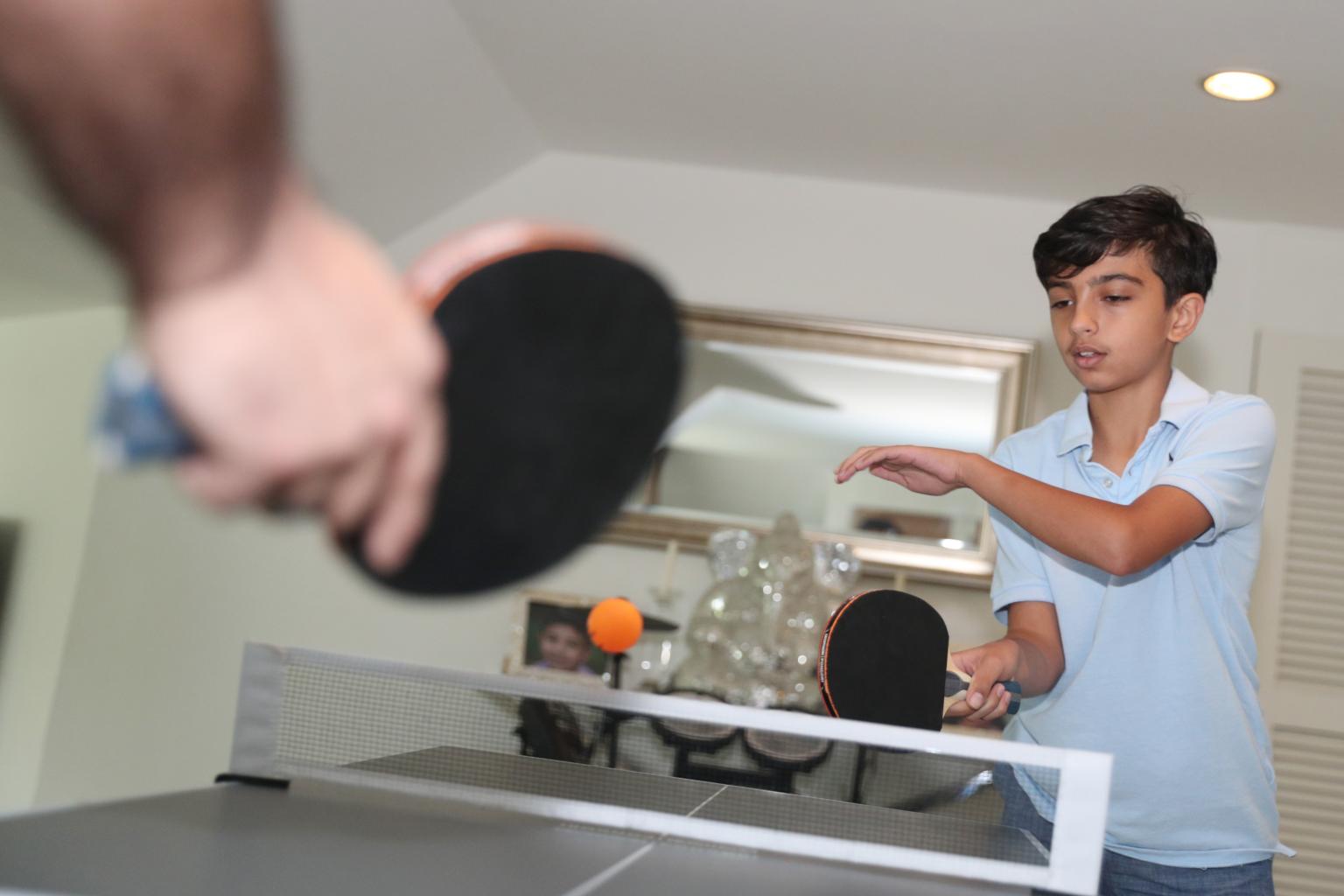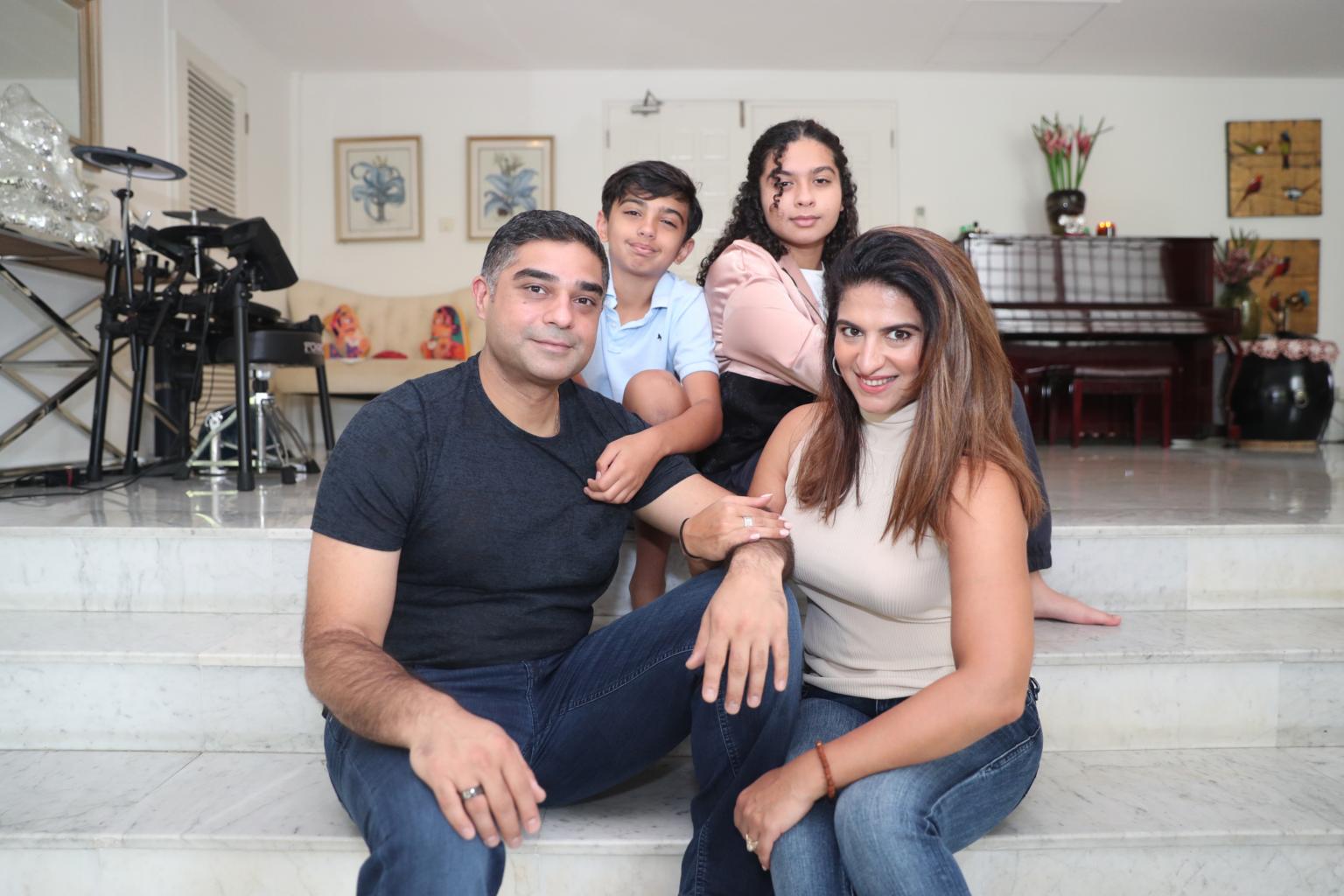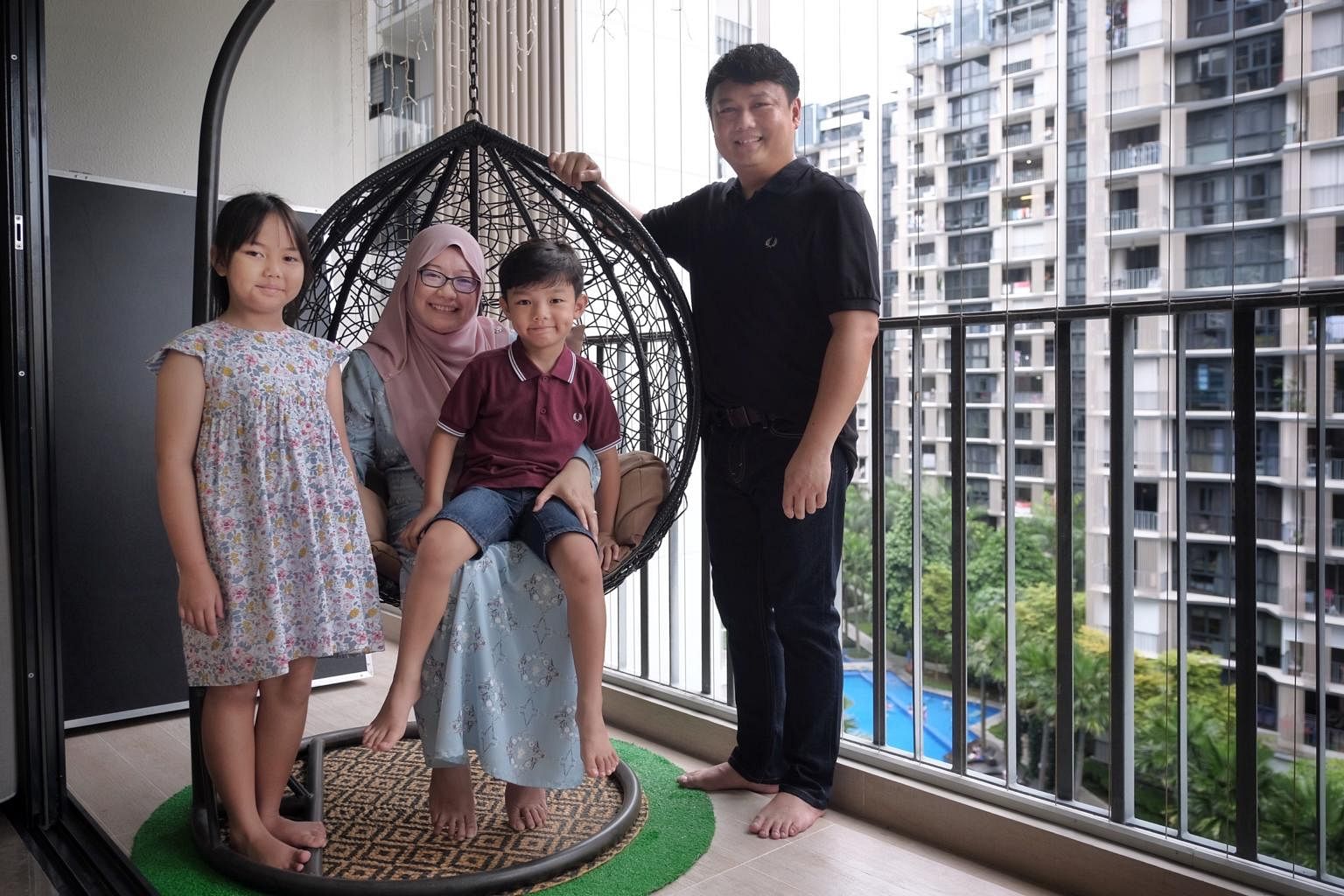A lost or more resilient generation? 6 ways Covid-19 changed childhood in Singapore
Sign up now: Get ST's newsletters delivered to your inbox

Yaash Kirpalani enjoys a game of ping pong with his father.
ST PHOTO: TIMOTHY DAVID
Follow topic:
SINGAPORE - Once upon a time, Children's Day was a joyous celebration of childhood in Singapore, a day to treasure the innocence and exuberance of little ones.
Children's Day on Friday, though, marks eight months of the toughest and strangest year for kids. They have had to grow up suddenly in the shadow of the pandemic, often with parents who were as scared and confused as they were.
"I felt kind of trapped in a cage because we were just locked into this house for 12, 13 hours a day, and we could only go outside for a short time," recalls Yaash Kirpalani, 11, of the circuit breaker.
Over the months, however, tantrums transformed into habit as kids learnt to wear masks every day, trepidation over Home-Based Learning (HBL) woes evolved into baby steps towards independent learning, and misery over social isolation changed to acceptance as they found new ways to connect.
The Straits Times takes a look at how the Covid-19 crisis has shaped childhood in Singapore so far this year.
1. THE PANDEMIC AFFECTED KIDS PHYSICALLY...
"Any major disaster or unfortunate event may have traumatic effects on children," says Dr Chan Poh Chong, head and senior consultant in the Division of General Ambulatory Paediatrics and Adolescent Medicine at the National University Hospital.
Some bounce back sooner than others, he says, but health experts report a variety of ailments following the pandemic's extreme disruptions.
Dr Mohana Rajakulendran, a consultant paediatrician at Parkway East Paediatric Clinic, noticed stranger anxiety among some toddlers who had limited social interaction during the circuit breaker.
Other tots had speech delays as busy parents resorted to digital babysitters while working from home, and a "large number of children" had constipation because of their sedentary routines and changes in diet during the circuit breaker.
More children with allergic rhinitis and asthma experienced flare-ups because they were confined to home environments with a high concentration of dust mites, she adds.
Dr Chan also points out that toddlers may also face developmental challenges as masks on other people hinder their ability to read facial expressions to learn about social reactions. They now have to use the tone of voice and body language as cues instead.
Parents can help by spending one-on-one time with their tots so they do not lag behind developmentally, Dr Mohana suggests. Engage in activities that promote speech and social development, such as reading together, chatting about their day, and talking about feelings and emotions.
2. ... AND EMOTIONALLY
"We see increased anxiety and depression in children post-circuit breaker," says Dr Celine Wong a consultant in the Department of Psychological Medicine at the National University Hospital (NUH).
Her department recorded about 12 per cent increase in new outpatient visits among kids aged seven to 18 from May to August, compared with the same period last year. Youth psychiatric admissions of teens aged 13 to 18 rose 21/2 times for the same comparative period.
Kids reported being depressed because they were isolated from their peer groups and struggling with HBL, Dr Wong says. They also had fewer outlets for physical activity, which helps manage stress.
"Isolation and loneliness among youth has been associated with decreased well-being and poorer mental health. Loneliness has also been associated with increased self-harm, eating disorder risk behaviours, as well as suicidal thoughts," Dr Wong explains.
Some children experienced "severe anxiety" when they had to return to school and keep up with academic expectations despite the educational disruptions, with some refusing to go to school, she adds.
As prolonged stress and anxiety can lead to clinical depression, parents should make sure kids maintain their usual routines and activities as much as possible, together with regular sleep, good eating habits and exercise.
She advocates a "judicious use" of gadgets and social media for teens as "youths need peer connections as well as healthy adult connections to stay mentally healthy".
With no end-date in sight for Covid-19, parents play a critical role as champions of their children's well-being in the months to come. Kids need a safe space at home to share their challenges without judgement, says Ms Skye Tan, a family life specialist with Focus on the Family.
3. SCREEN TIME BECAME A BLESSING AND A CURSE
In many countries, experts are concerned about millions of schoolgoing children who will miss key educational milestones because of extended school closures and multi-faceted problems with home-based learning. A BBC report in June even pondered if they would be a "lost generation".
Singapore has fared much better in comparison, thanks to a generally successful HBL transition during the circuit breaker and schools reopening after a three-month break. Whether their parents liked it or not, kids here have learnt to be technologically savvy to survive.
Beyond just a medium for learning, screen time has now evolved into a way for kids to connect with friends and family while staying safe, says Dr. G. Kaveri, a lecturer in Early Childhood Education at the S R Nathan School of Human Development in the Singapore University of Social Sciences.
While this is necessary at the moment, she worries about the impact of increased screen time on the already high rate of myopia here.

Parents like Mrs Pamela Kirpalani, 39, an interpersonal communications coach and author, have had to weigh concerns about addiction with the social benefits of screen time. She discovered that her son Yaash and his classmates used the popular game Fortnite as a socialising and bonding platform.
"It became a bit of a dichotomy for us," she says. "We knew that that was their way to connect, and we didn't want them to stop connecting.
"There was a lot of teamwork going on in these games as well. Yaash at one point was teaching people how to strategise."
4. SOME NEEDED HELP TO KEEP UP
The pandemic reinforced sobering social realities as well. Many children from disadvantaged backgrounds found it harder to adapt to HBL, even though the Ministry of Education and private groups stepped in to help with tech and other forms of support.
That is because kids need "a conducive home environment that includes resources such as Internet access, physical space, a computer and a mature adult to facilitate children's learning", Dr Kaveri explains.
"These may not be readily available for children from disadvantaged backgrounds, thus having implications for their learning and development."
It has also led to worries that such "inequalities will be entrenched" says sociologist Paulin Straughan, dean of students at the Singapore Management University. She hopes schools will "pay more attention to these children and help them catch up".
However, she does see a silver lining in the situation: "As inequalities are rendered visible, our children will also see the marginalised groups in our community and I hope, grow compassion for these vulnerable groups. They will also see how well we cope as a community and the value of an integrated society with strong ties."
5. KIDS GREW CLOSER TO THEIR PARENTS
Despite the calamity it sowed, the pandemic bestowed the gift of time, which is a "very powerful investment in building strong relationships", says Ms Tan of Focus on the Family.
The charity's recent survey of 1,052 children aged 10 to 15 bears this out, with over seven in 10 kids saying they were close to their parents.
As parents had to play an active role in HBL, they also grew to understand their children's strengths and learning needs, which will strengthen family ties as well, Ms Tan adds

Looking back, secondary school teacher Suryati Mail, 40, is thankful for the "good quality time" she and her husband spent with their two kids aged six and nine during the circuit breaker. The family started a gardening hobby on their balcony and baked Hari Raya goodies together.
"We really appreciate that time, even though it was difficult."
6. THEY LEARNT TO BE RESILIENT
Ms Suryati marvels at how her young kids have adapted to a largely stay-home life even now, with subdued birthday parties at home and occasional outings to local attractions.
Prof Straughan reckons that despite the fissures, "this generation of children will emerge stronger from the pandemic" because the country has managed community spread well so far.
Dr Chan adds: "The good thing about most children is that they are more resilient than we think, and the majority will be able to bounce back to their new normal activities and adjust accordingly without long term consequences."

